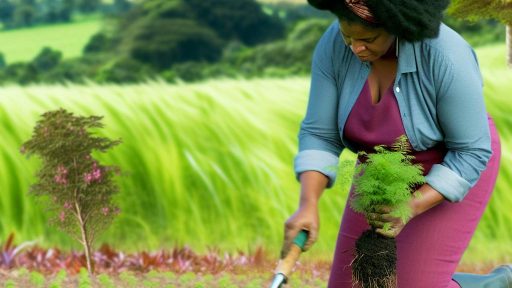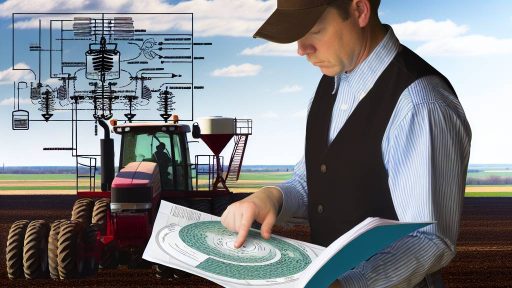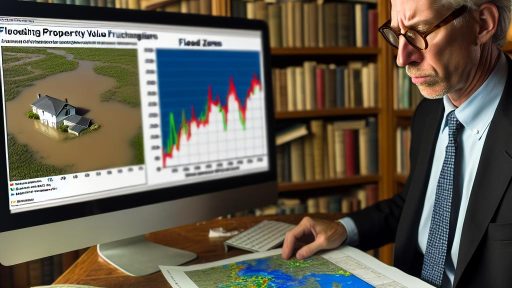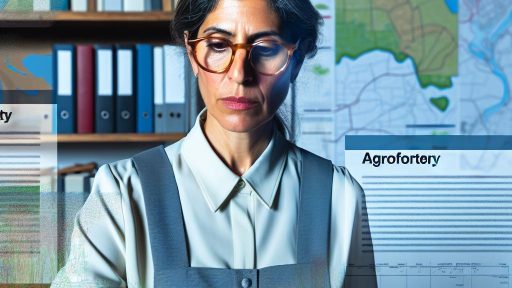Introduction to Sustainable Farmland Irrigation
Sustainable farmland irrigation optimizes water use in agriculture.
This method conserves water while enhancing crop yields.
Real estate investors increasingly recognize its value.
Firstly, sustainable practices improve land attractiveness.
Moreover, they can enhance property values over time.
Importance of Sustainable Practices
Sustainable irrigation methods reduce environmental impact.
This aligns with growing consumer demand for eco-friendly practices.
As a result, properties utilizing sustainable methods attract attention.
Investors benefit from these trends through higher occupancy rates.
Economic Advantages of Sustainable Irrigation
Sustainable irrigation techniques often lower operational costs.
Efficient water use can decrease utility expenses significantly.
In addition, these systems often lead to improved soil quality.
Healthy soil contributes to higher agricultural output.
This creates a stable income stream for investors.
Attracting Environmentally Conscious Buyers
Today’s buyers prioritize sustainability in their purchasing decisions.
Transform Your Agribusiness
Unlock your farm's potential with expert advice tailored to your needs. Get actionable steps that drive real results.
Get StartedThis shift creates opportunities for investors in eco-friendly properties.
Furthermore, properties with sustainable irrigation systems stand out.
They appeal to those seeking to minimize their ecological footprint.
Long-Term Resilience Against Climate Change
Sustainable irrigation systems enhance resilience to climate change.
These systems adapt better to variable weather patterns.
Investors benefit by mitigating risks associated with droughts and floods.
Thus, they can ensure steady returns even in adverse conditions.
Understanding the Principles of Sustainable Irrigation Practices
Defining Sustainable Irrigation
Sustainable irrigation emphasizes efficient water use.
It aims to balance crop needs with water availability.
This practice reduces water waste and conserves resources.
Benefits of Sustainable Irrigation
Sustainable irrigation enhances agricultural productivity.
It minimizes environmental impact and supports local ecosystems.
Farmers can achieve higher yields with less water.
Techniques for Sustainable Irrigation
Drip irrigation delivers water directly to plant roots.
This method reduces evaporation and runoff significantly.
Moreover, timing irrigation based on weather forecasts proves effective.
Technological Innovations
Modern technology plays a crucial role in sustainable irrigation.
Smart sensors help monitor soil moisture levels.
Data-driven decisions can optimize irrigation schedules.
Challenges and Solutions
Implementing sustainable irrigation may face obstacles.
High initial costs can deter farmers from adopting new systems.
However, government subsidies can ease financial burdens.
Sustainable Practices
Sustainable irrigation practices pave the way for future agriculture.
They align with global efforts to conserve natural resources.
Showcase Your Farming Business
Publish your professional farming services profile on our blog for a one-time fee of $200 and reach a dedicated audience of farmers and agribusiness owners.
Publish Your ProfileReal estate investors recognize the importance of sustainable practices.
Economic Benefits of Sustainable Irrigation
Increasing Crop Yields
Sustainable irrigation plays a crucial role in increasing crop yields.
By optimizing water usage, farmers can ensure crops receive the right amount of moisture.
This practice results in healthier plants that produce more fruit or grain.
The enhanced crop production directly correlates with increased profitability.
Additionally, sustainable irrigation technology often includes weather and soil monitoring.
This data helps farmers make informed decisions about water application.
Consequently, they can maximize yields by aligning water supply with crop needs.
Improving Profitability
Investing in sustainable irrigation systems can significantly reduce costs.
These systems use resources more efficiently, minimizing waste and expenses.
Lower water bills and reduced energy consumption enhance overall profitability.
Moreover, sustainable practices can attract premium pricing for crops.
Consumers increasingly prefer sustainably produced food but are often willing to pay more.
This competitive advantage helps farmers boost their bottom lines.
Adapting to Climate Change
Climate change presents significant challenges to agricultural production.
Adopting sustainable irrigation methods helps mitigate these impacts.
These practices improve drought resilience, ensuring crops thrive during dry spells.
Furthermore, sustainable irrigation can help manage excess rainfall more effectively.
By collecting and storing rainwater, farmers can safeguard against flooding.
Such adaptability secures stable income streams in fluctuating climates.
Accessing Financial Incentives
Many governments and organizations offer financial assistance for sustainable practices.
Investors can access grants or low-interest loans for irrigation projects.
These financial incentives lower the barrier to adopting advanced irrigation technologies.
As a result, investors enhance their operations without bearing the full financial burden.
In addition, sustainable farming can lead to improved land value.
Investors can benefit from higher returns when selling eco-friendly farmland.
You Might Also Like: Agroforestry Techniques for Enhancing Soil Health on Agricultural Land
Environmental Advantages
Preserving Water Resources
Sustainable farmland irrigation significantly reduces water waste.
By implementing advanced techniques, farmers can maximize efficiency.
These methods minimize reliance on natural water sources.
Moreover, they protect local waterways from over-extraction.
As a result, ecosystems remain healthy and vibrant.
Enhancing Soil Health
Effective irrigation practices improve soil quality over time.
They minimize erosion by maintaining moisture levels.
This leads to increased nutrient retention in the soil.
Additionally, healthy soils support diverse microbial life.
Consequently, crops thrive and yield better harvests.
Long-Term Environmental Benefits
Investing in sustainable irrigation promotes long-term sustainability.
Sustainable practices contribute to agricultural resilience.
Farmers can adapt to climate changes more readily.
Showcase Your Farming Business
Publish your professional farming services profile on our blog for a one-time fee of $200 and reach a dedicated audience of farmers and agribusiness owners.
Publish Your ProfileFurthermore, sustainable irrigation enhances farmland biodiversity.
This diversity leads to more robust ecosystems surrounding farms.
You Might Also Like: Mitigating Climate Risks: Economic Approaches for Farmers
Case Studies of Successful Real Estate Investment Projects Utilizing Sustainable Irrigation
Innovative Approaches in Sustainable Irrigation
Real estate investors increasingly recognize the benefits of sustainable irrigation systems.
These systems enhance soil health and water conservation in farmland.
Many projects underline the advantages such as increased crop yield and reduced water usage.
Green Acres Farming Initiative
The Green Acres initiative transformed underperforming farmland into a thriving agricultural hub.
Investors adopted drip irrigation technology to optimize water efficiency.
This approach significantly decreased water waste while boosting productivity.
As a result, the project yielded a 40% increase in crop production.
Furthermore, the increased yield attracted more investors interested in sustainable practices.
Sunny Valley Organic Farms
This innovative method reduced reliance on groundwater resources.
The project enhanced soil moisture and promoted crop resilience during dry spells.
Subsequently, investors saw a dramatic rate of return due to the increased resilience of the crops.
Pioneer Crop Irrigation Solutions
Pioneer Crop Irrigation invested in soil moisture monitoring technology.
This technology allowed for precise watering based on crop needs.
As a future-focused strategy, it significantly cut down water costs.
Investors benefited from improved plant health and lower operational expenses.
The project exemplifies how technology can drive sustainable practices in agriculture.
Impact on Land Value
Investing in sustainable farmland irrigation systems positively impacts land value.
Properties equipped with smart irrigation commands higher prices in the market.
Furthermore, sustainable practices appeal to eco-conscious buyers and investors.
Such demand translates to enduring value appreciation for investors.
Collaborations for Success
Various partnership models have emerged around sustainable irrigation projects.
Collaborations with local governments enhance project sustainability.
These partnerships can provide funding and technical support for investors.
Through collaboration, investors access valuable resources and expertise.
Ultimately, this leads to more successful and scalable agricultural projects.
You Might Also Like: Financial Benefits of Sustainable and Climate-Friendly Farms
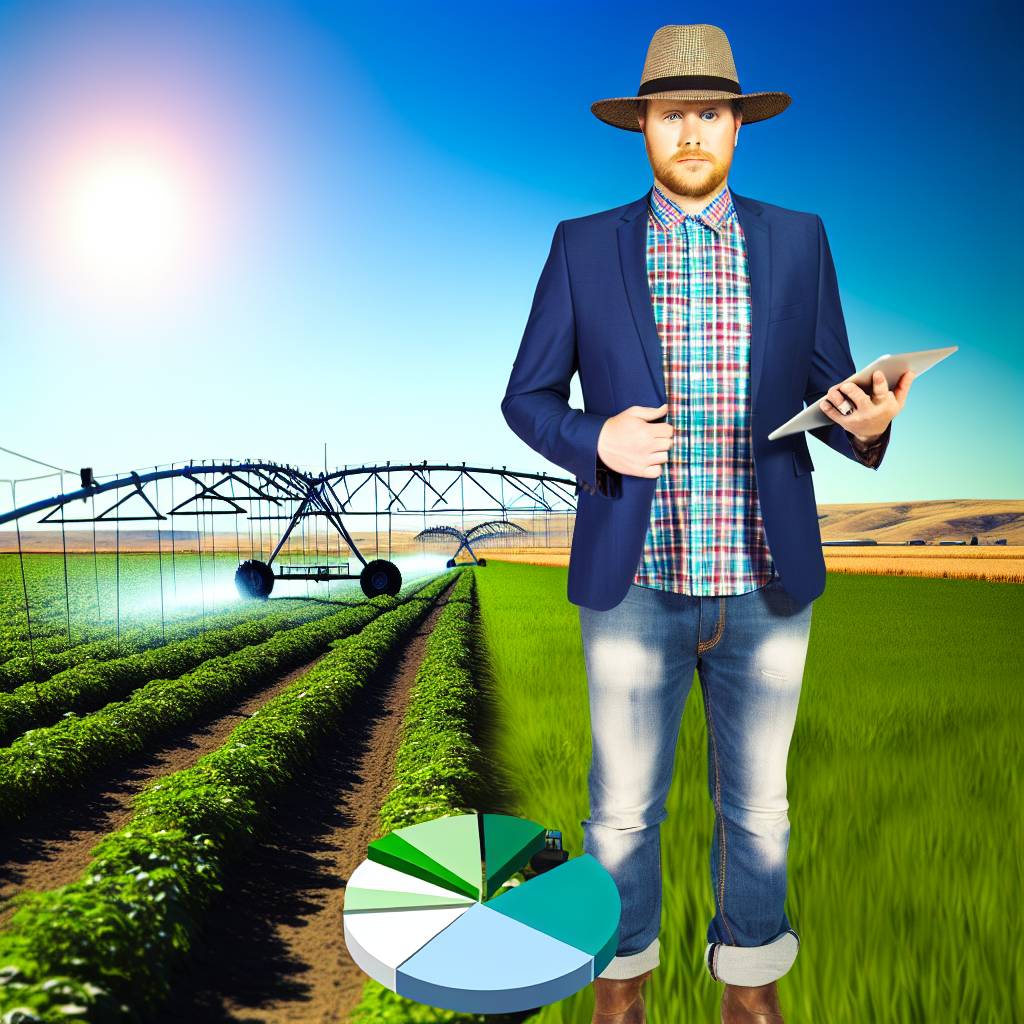
The Role of Technology in Improving Irrigation Efficiency for Farmland
Advanced Irrigation Technologies
Technology plays a crucial role in modern irrigation practices.
Smart irrigation systems optimize water usage for crops.
These systems use sensors to monitor soil moisture levels.
Additionally, they can automate watering schedules based on weather conditions.
Remote monitoring allows farmers to manage their irrigation from anywhere.
Benefits of Precision Agriculture
Precision agriculture technologies enhance irrigation efficiency significantly.
Farmers utilize GPS mapping to identify crucial growing areas.
This approach enables targeted irrigation practices, conserving water.
Sensors can provide real-time data on crop health as well.
As a result, farmers can adjust their strategies for better outcomes.
Showcase Your Farming Business
Publish your professional farming services profile on our blog for a one-time fee of $200 and reach a dedicated audience of farmers and agribusiness owners.
Publish Your ProfileCost Savings through Efficient Irrigation
Implementing improved irrigation technology can lead to cost savings.
By using less water, farmers reduce their utility bills.
Seed and fertilizer costs also decrease when watering is efficient.
Moreover, crops yield higher returns due to optimized growth conditions.
Environmental Impact of Sustainable Irrigation
Sustainable irrigation technologies promote environmental conservation.
These methods help reduce water wastage significantly.
Consequently, they limit the impact on local water sources.
Moreover, healthier soil leads to better crop resilience.
This approach contributes to overall ecological health.
Find Out More: Farmers’ Solutions to Climate Change Impacts
Impact of Sustainable Irrigation on Property Value and Investment Appeal
Enhancing Property Value
Sustainable irrigation systems significantly enhance the value of farmland properties.
Investors recognize the long-term benefits of these eco-friendly systems.
Properties equipped with efficient irrigation attract higher selling prices.
In many areas, sustainable practices can lead to reduced water costs.
This financial advantage makes such properties more appealing to buyers.
Increasing Investment Appeal
Investors are increasingly drawn to sustainable farmland for several reasons.
One key factor is the demand for organic produce and sustainable products.
These trends are reflected in consumer preferences and willingness to pay more.
Additionally, sustainable practices often qualify for government incentives.
These incentives can enhance cash flow and reduce upfront costs.
Positive Environmental Impact
Investing in sustainable irrigation supports environmental stewardship.
It reduces soil erosion and promotes better soil health.
Moreover, these practices help conserve water resources.
Such initiatives align with global efforts to combat climate change.
As a result, investors can feel proud about their contributions.
Future-Proofing Investments
Sustainable farmland irrigation is a hedge against future uncertainties.
Climate change affects weather patterns, impacting water availability.
By adopting sustainable methods, investors build resilience into their operations.
This long-term viability increases the attraction of sustainable agriculture.
Investors are less likely to face losses due to water scarcity.
Long-Term Strategies for Integrating Sustainable Practices in Real Estate Investments
Understanding the Importance of Sustainable Farmland Irrigation
Sustainable farmland irrigation optimizes water use efficiency.
This practice conserves precious water resources for future generations.
Moreover, it enhances soil health and crop yields.
In turn, these benefits attract responsible real estate investors.
Developing Sustainable Irrigation Techniques
Investors can implement advanced irrigation systems.
Drip irrigation, for instance, delivers water directly to plant roots.
Additionally, precision irrigation technology assesses moisture levels.
This allows for timely and efficient water application.
These techniques minimize waste and improve sustainability.
Incorporating Renewable Energy Sources
Utilizing renewable energy for irrigation reduces carbon footprints.
Showcase Your Farming Business
Publish your professional farming services profile on our blog for a one-time fee of $200 and reach a dedicated audience of farmers and agribusiness owners.
Publish Your ProfileSolar panels can power pumping stations effectively.
Wind turbines also offer sustainable energy solutions for irrigation.
Such investments appeal to eco-conscious buyers and renters.
Engaging with Local Communities
Engaging local communities fosters goodwill around real estate projects.
This involvement ensures sustainable practices align with community needs.
Investors can partner with local agricultural organizations.
Such collaborations can enhance water conservation initiatives.
Promoting Educational Initiatives
Education fosters a deeper understanding of sustainable practices.
Investors can host workshops on efficient irrigation methods.
These educational initiatives can create a knowledgeable community.
Ultimately, informed community members support sustainable investments.
Monitoring and Adapting Strategies
Real estate investors should continuously monitor irrigation practices.
Data collection on water usage helps identify inefficiencies.
Regular assessments allow for timely adaptations in irrigation methods.
Investing in technology enhances the ability to make informed decisions.
Additional Resources
Climate Change Impacts on Agriculture and Food Supply | US EPA
Partnerships for Climate-Smart Commodities Project Summaries …

